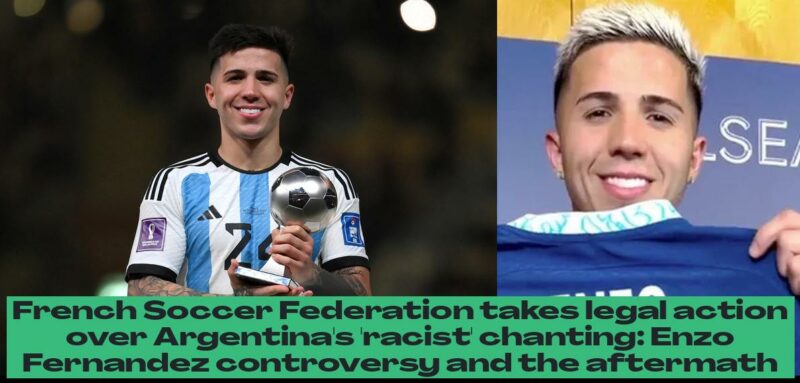Enzo Fernandez controversy: French Soccer Federation files legal action over Argentina’s ‘racist’ chanting
The world of football was thrown into a storm of controversy after a video surfaced online showing Argentina’s players, including Chelsea midfielder Enzo Fernandez, engaged in offensive chanting that targeted French players. The chants, which included racial slurs and derogatory remarks, sparked outrage and condemnation from various quarters, including the French Soccer Federation (FFF) and several prominent figures in the sport. The incident, which occurred after Argentina’s Copa America victory, has ignited a debate about racism and discrimination in football and has led to the FFF taking legal action against Argentina.
The FFF, in a strongly worded statement, denounced the “unacceptable racist and discriminatory remarks” made by Argentina’s players and supporters. The statement highlighted the chants’ contradiction with the values of sportsmanship and human rights, emphasizing that such behavior has no place in football. Philippe Diallo, the president of the FFF, has filed a legal complaint against Argentina, calling for FIFA and the Argentina Football Association (AFA) to take disciplinary action against the perpetrators.
The controversy was ignited by Chelsea defender and France international Wesley Fofana, who brought the video to light on social media, branding the chants as “unhibited racism.” Fofana, who is a teammate of Fernandez at Chelsea, expressed his disappointment and disgust at the behavior displayed by his teammate and his fellow Argentinians. The incident has created a tense atmosphere between the two players, with Fofana and other French players at Chelsea, including Axel Disasi and Malo Gusto, unfollowing Fernandez on social media.
The chants in question, which were directed at the French players, allegedly contained references to their family lineage, as well as homophobic and transphobic slurs. This incident comes on the heels of the 2022 World Cup final, where Argentina defeated France on penalties. The final was marred by controversy, with Argentina goalkeeper Emiliano Martinez’s actions, including his mocking of Kylian Mbappe, fueling tensions between the two teams.
The controversy surrounding Fernandez’s actions has sparked a debate about the role of players in addressing racism and discrimination in football. While some argue that players should be held accountable for their actions, others argue that the responsibility lies with the governing bodies and football clubs to create a more inclusive and equitable environment. The incident also raises questions about the impact of social media on football and the responsibility of players to use their platforms responsibly.
- The French Soccer Federation (FFF) has taken legal action against Argentina over racist chanting by players, including Enzo Fernandez, targeting French players.
- The FFF denounced the racist and discriminatory remarks made by Argentina’s players and emphasized that such behavior has no place in football.
- Chelsea defender Wesley Fofana brought the video of the offensive chanting to light on social media, leading to a tense atmosphere between him and his teammate Enzo Fernandez.
- The chants directed at French players allegedly contained racial slurs, derogatory remarks about family lineage, as well as homophobic and transphobic slurs.
- This controversy has sparked a debate about racism in football and the role of players in addressing such issues.
What was in the chant?
The video that sparked the controversy showed Argentina’s players celebrating their Copa America victory with chants directed at French players. The chants were filled with offensive language, including racial slurs, homophobic and transphobic remarks, and derogatory references to the French players’ family lineage. This incident, which occurred just months after the 2022 World Cup final, added fuel to the rivalry between Argentina and France, which had been simmering since their heated encounter on the world stage.
The chants, which were widely shared on social media, were met with immediate condemnation from various quarters, including the FFF, fellow players, and football fans around the world. The incident highlighted the pervasive issue of racism and discrimination in football, a problem that has plagued the sport for decades. The chants were particularly concerning because they targeted players based on their race, sexual orientation, and family background, highlighting the insidious nature of prejudice and bigotry.
The incident also raised questions about the responsibility of players to use their platforms responsibly. As role models for millions of fans worldwide, footballers have a moral obligation to promote positive values and combat prejudice. The chants in question, however, demonstrated a blatant disregard for these principles, contributing to a culture of intolerance and hate in football.
The incident has also highlighted the need for better education and awareness regarding racism and discrimination in football. Many players and fans lack a proper understanding of the impact of their words and actions, which can contribute to a culture of silence and complacency around these issues. By raising awareness and fostering open dialogue, football can take steps towards creating a more inclusive and welcoming environment for all.
The controversy surrounding the chants is a reminder that football is not immune to the societal issues that plague the world. The sport has a responsibility to address these issues head-on, promoting tolerance, understanding, and respect for all. The incident also underscores the importance of accountability, with players, clubs, and governing bodies working together to eradicate racism and discrimination from the beautiful game.
What has the FFF said?
The FFF, the governing body for football in France, has condemned the chants in the strongest possible terms, calling them “unacceptable” and “shocking.” The FFF has taken a firm stance against racism and discrimination, making it clear that such behavior has no place in football. In a statement released shortly after the video surfaced, the FFF president, Philippe Diallo, expressed his outrage and announced his intention to take legal action against Argentina.
The FFF’s statement highlighted the chants’ contradiction with the values of sportsmanship and human rights, emphasizing the importance of promoting inclusivity and respect in football. The statement also expressed concerns about the impact of the chants on the players targeted, emphasizing the need for accountability and consequences for those involved.
The FFF’s decision to take legal action against Argentina is a significant step in the fight against racism and discrimination in football. By taking a strong stance and holding Argentina accountable, the FFF is sending a clear message that such behavior will not be tolerated. This action is also a powerful statement of solidarity with the players targeted by the chants, demonstrating that the FFF stands with them and will fight for their rights.
The FFF’s response has been widely praised by many, including players, fans, and anti-racism organizations. The organization’s commitment to fighting racism and promoting inclusivity is a positive example for other football governing bodies worldwide. The FFF’s actions demonstrate that football has a responsibility to address these issues head-on, promoting tolerance, understanding, and respect for all.
Aren’t Fofana and Fernandez teammates?
The controversy surrounding the chants has also created a tense situation between Fofana and Fernandez, who are teammates at Chelsea. While the two players have been teammates for the past 18 months, the incident has created a wedge between them, with Fofana and other French players at Chelsea unfollowing Fernandez on social media. The incident has highlighted the complex relationship between players from different countries and cultures, even when they share a common profession and play for the same club.
The rivalry between France and Argentina, which intensified after their World Cup final clash, has also played a role in the tension between Fofana and Fernandez. The chants, which were directed at French players, were seen by many as a continuation of the rivalry between the two teams, with the incident further fueling tensions between the players and fans from both countries.
The incident has also raised questions about the responsibility of club managers and officials to address issues of racism and discrimination within their teams. While clubs have a responsibility to create an inclusive and welcoming environment for all players, the incident has demonstrated the challenges they face in managing these issues, particularly when they involve players from different backgrounds and cultures.
The controversy surrounding Fofana and Fernandez is a reminder that racism and discrimination are not confined to the football pitch. These issues are deeply embedded in society and can manifest in various forms, including personal relationships and professional interactions. By addressing these issues head-on, football can take steps towards creating a more inclusive and equitable environment for all players, fans, and staff.
Has Fernandez apologized?
Fernandez, the Chelsea midfielder at the center of the controversy, has issued a public apology for his involvement in the offensive chants. In a statement posted on social media, Fernandez expressed his regret for his actions, acknowledging that the chants were “highly offensive” and that there was “absolutely no excuse” for his behavior. He also stated that he stands against discrimination in all forms and apologized for getting caught up in the euphoria of Argentina’s Copa America celebrations.
Fernandez’s apology has been met with mixed reactions. While some have accepted his apology and acknowledged his remorse, others have expressed skepticism, questioning whether his apology was sincere and whether he fully understands the gravity of his actions. The incident has sparked a debate about the role of apologies in addressing racism and discrimination. While apologies are important in acknowledging wrongdoing and expressing remorse, they are not a substitute for taking concrete actions to combat prejudice and promote inclusivity.
Fernandez’s apology is a step in the right direction, but it is important to remember that his actions have consequences. The FFF’s legal action against Argentina and the potential disciplinary actions from Chelsea and the Premier League demonstrate that there will be accountability for his behavior. The incident is also a reminder that players have a responsibility to use their platforms responsibly and to promote positive values.
Fernandez’s apology is a step in the right direction but it is important to remember that his actions have consequences. The FFF’s legal action against Argentina and the potential disciplinary actions from Chelsea and the Premier League demonstrate that there will be accountability for his behavior. The incident is also a reminder that players have a responsibility to use their platforms responsibly and to promote positive values.
What comes next?
The controversy surrounding the chants is far from over. The FFF’s legal action against Argentina is expected to proceed, with the outcome potentially setting a precedent for how football governing bodies address racism and discrimination in the future. FIFA and the AFA are also expected to investigate the incident, with potential disciplinary action against Argentina’s players and supporters.
Chelsea, Fernandez’s club, has also confirmed that it will take internal action to address the situation. The club has stated that it finds all forms of discriminatory behavior unacceptable, emphasizing its commitment to creating an inclusive and welcoming environment for all. Chelsea has also acknowledged Fernandez’s apology and pledged to use the incident as an opportunity to educate its players about racism and discrimination.
The Premier League, the governing body for professional football in England, could also take action against Fernandez. The league has a strong stance against racism and discrimination, and it has previously taken disciplinary action against players for similar offenses. The Premier League’s response to the incident will be closely watched, as it will further demonstrate the league’s commitment to promoting inclusivity and combating prejudice.
The controversy surrounding the chants is a defining moment for football. The incident has highlighted the pervasive issue of racism and discrimination in the sport, and it has sparked a debate about the role of players, clubs, and governing bodies in addressing these issues. The response to the incident will be a test of football’s commitment to creating a more inclusive and equitable environment for all.









